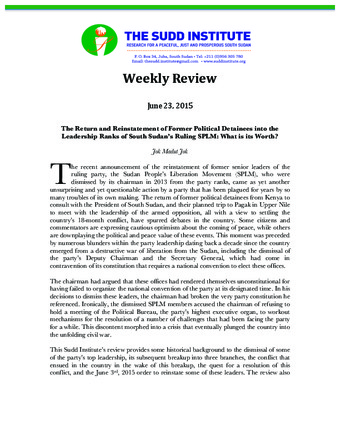The Return and Reinstatement of Former Political Detainees into the Leadership Ranks of South Sudan’s Ruling SPLM: What is its Worth?
Publication Summary
The recent announcement of the reinstatement of former senior leaders of the ruling party, the Sudan People’s Liberation Movement (SPLM), who were dismissed by its chairman in 2013 from the party ranks, came as yet another unsurprising and yet questionable action by a party that has been plagued for years by so many troubles of its own making. The return of former political detainees from Kenya to consult with the President of South Sudan, and their planned trip to Pagak in Upper Nile to meet with the leadership of the armed opposition, all with a view to settling the country’s 18-month conflict, have spurred debates in the country. Some citizens and commentators are expressing cautious optimism about the coming of peace, while others are downplaying the political and peace value of these events. This moment was preceded by numerous blunders within the party leadership dating back a decade since the country emerged from a destructive war of liberation from the Sudan, including the dismissal of the party’s Deputy Chairman and the Secretary General, which had come in contravention of its constitution that requires a national convention to elect these offices.
The chairman had argued that these offices had rendered themselves unconstitutional for having failed to organize the national convention of the party at its designated time. In his decisions to dismiss these leaders, the chairman had broken the very party constitution he referenced. Ironically, the dismissed SPLM members accused the chairman of refusing to hold a meeting of the Political Bureau, the party’s highest executive organ, to workout mechanisms for the resolution of a number of challenges that had been facing the party for a while. This discontent morphed into a crisis that eventually plunged the country into the unfolding civil war.
This Sudd Institute’s review provides some historical background to the dismissal of some of the party’s top leadership, its subsequent breakup into three branches, the conflict that ensued in the country in the wake of this breakup, the quest for a resolution of this conflict, and the June 3rd, 2015 order to reinstate some of these leaders. The review also weighs the significance of these developments in terms of ending the conflict and shaping the future path for the party and the country.
Jok Madut Jok is trained in the anthropology of health and holds a Ph.D. from the University of California, Los Angeles (UCLA). He is a fellow of Rift Valley Institute and Director of the Sudd Institute. Jok has held fellowship positions at a number of other institutions, including the United States Institute of Peace and the Woodrow Wilson International Center for Scholars. He also served in the Government of South Sudan as undersecretary in the Ministry of Culture and Heritage for three years. He has also worked in aid and development and author of four books and numerous articles covering gender, sexuality and reproductive health, humanitarian aid, ethnography of political violence, gender-based violence, war and slavery, and the politics of identity in South Sudan and Sudan. His book Breaking Sudan: The Search for Peace, was published in 2017 by OneWorld.

